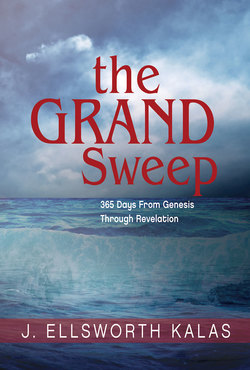Читать книгу The Grand Sweep - Large Print - J. Ellsworth Kalas - Страница 44
На сайте Литреса книга снята с продажи.
ОглавлениеPrayer Time
Let us list five specific places of worship for which we will offer prayer daily—for the people who worship there, for those who provide leadership, for the weary or the casual who may come.
How the Drama Develops EXODUS 13–33
In the drama of life as we experience it, no week is so crucial as the one that follows a climactic occasion—especially a climactic victory. Life’s great events are almost always followed by the routine, and it’s in the routine that we are so easily caught off guard. Israel had been in Egypt for 430 years, most of the time as slaves. Now they are free, headed to the land of promise.
But it isn’t going to be easy. The journey to fulfillment never is. First, there is the Red Sea, which is enough to make the people feel they never should have left Egypt. Then a common complaint, the daily menu! In the eternal measure of things, this may seem trivial; but then you remember what happened to Esau when he was hungry, and you remind yourself that life is lived out at just such common junctures. Still worse, for Israel, there is a shortage of water. In each instance of trouble, the people blame God and lodge their complaints with God’s representative, Moses.
Life’s problems rarely, if ever, have simple solutions. Mostly, they have to be lived with, contained and controlled so they do not frustrate the ultimate purposes of our living. One such aid comes in quite human fashion in Exodus 18 when Jethro, Moses’ father-in-law, gives him some administrative counsel intended to save Moses both time and frustration. Then, at quite another level, in Exodus 20, Moses receives the Ten Commandments, a profound and eternal pattern of conduct.
Does it seem trivial to link Jethro’s advice and the Decalogue, as if the two were somehow comparable? I do so only to indicate that our lives are lived by both great principles and by simple hints and insights. And while no managerial advice is to be compared with the Ten Commandments, both have a place in our lives.
Life is also minutiae. The Ten Commandments seem to cover all the really great issues, but the Israelites will have to fulfill those commandments in everyday places—the world of nature, of daily labor, and of other people, including possible enemies. So details must be spelled out. Their house of worship also has details that seem like minutiae. In the instance of the portable Tabernacle, however, the details are crucially significant, because they have meaning beyond taste and aesthetics. The Hebrew Scriptures considered each detail to be holy, each one revealing something of the character of God and of their relationship to God. Later, the New Testament writers would find symbolic importance in each part.
Call it grace, call it the work of the Holy Spirit, call it a miracle; I only know that the best history of the church is written in little names.
—From Strong Was Her Faith: Women of the New Testament (2007, 2012); page 59
But as our plot continues to unfold, it is with a people who are on the move. I will dare to say they are on a pilgrimage, though they don’t often act that way. More often they seem to be no better than a group of grumbling tourists who think they ought to be getting better provisions for what they’ve invested. That may seem a strange statement for a people who have been delivered from slavery, but they dare now and then to suggest that they were better off when they were slaves. No matter; they are headed for a destination that, while it is not clearly known, is full of promise, a place of “milk and honey.” That prospect keeps them going, even if sometimes falteringly. And if the specific destination is not entirely clear, the way there is even more complicated. That’s the way life is—full of promise but rarely simple.
Seeing Life Through Scripture
Next to the Twenty-third Psalm, the Ten Commandments are probably the most familiar longer passage of Scripture. People may not know where to find them or be able to recite all ten; but they know they exist, they probably can tell you two or three, and they’re sure that they’re important.
If taken as presented, they are not simply important; they are crucially so. Obviously, it matters whether we believe in “You shall not murder,” “You shall not commit adultery,” “You shall not steal.” But the general human community is likely to miss the most important commandments, the ones that undergird all the other more easily recognized ones. These commandments begin with “You shall have no other gods before me,” and all else ultimately depends on the seriousness with which one accepts this commandment.
If the commandments are at face value important, what can be said for the details of the ancient Tabernacle? Is there anything to be learned, other than perhaps some little-understood cultural history? I believe so. At the least, let us be reminded that places can be sacred, not in the sense that they are to be worshiped but in the sense of bringing reverence to our lives. And let us confess we tend to be short of that sense of the sacred, of the reverent, today. We should let some hush settle on our lives when we read of a people who once built, and moved with them, a place of worship, a site of sacredness, in the howling wilderness.
The Sum of It All
“I am the LORD your God, who brought you out of the land of Egypt, out of the house of slavery; you shall have no other gods before me” (Exodus 20:2-3).
